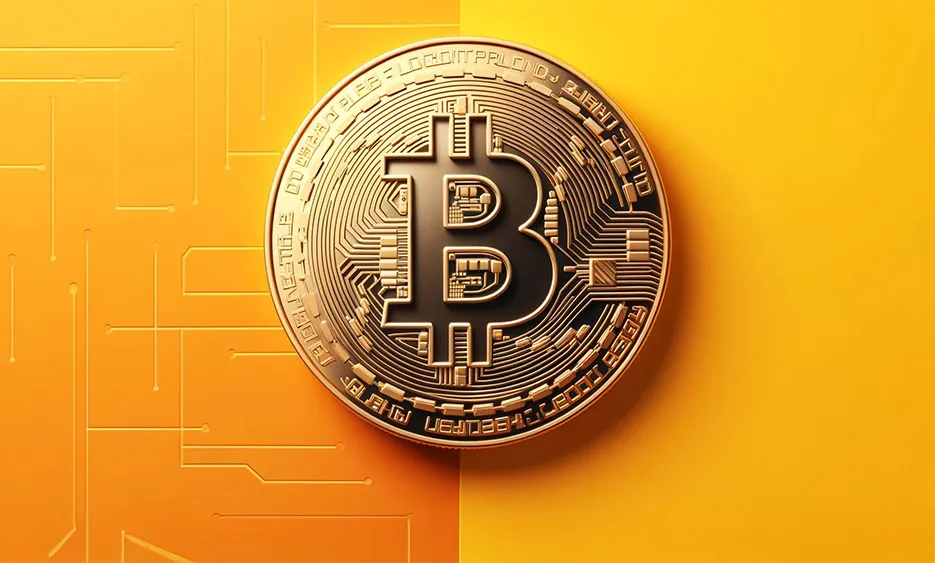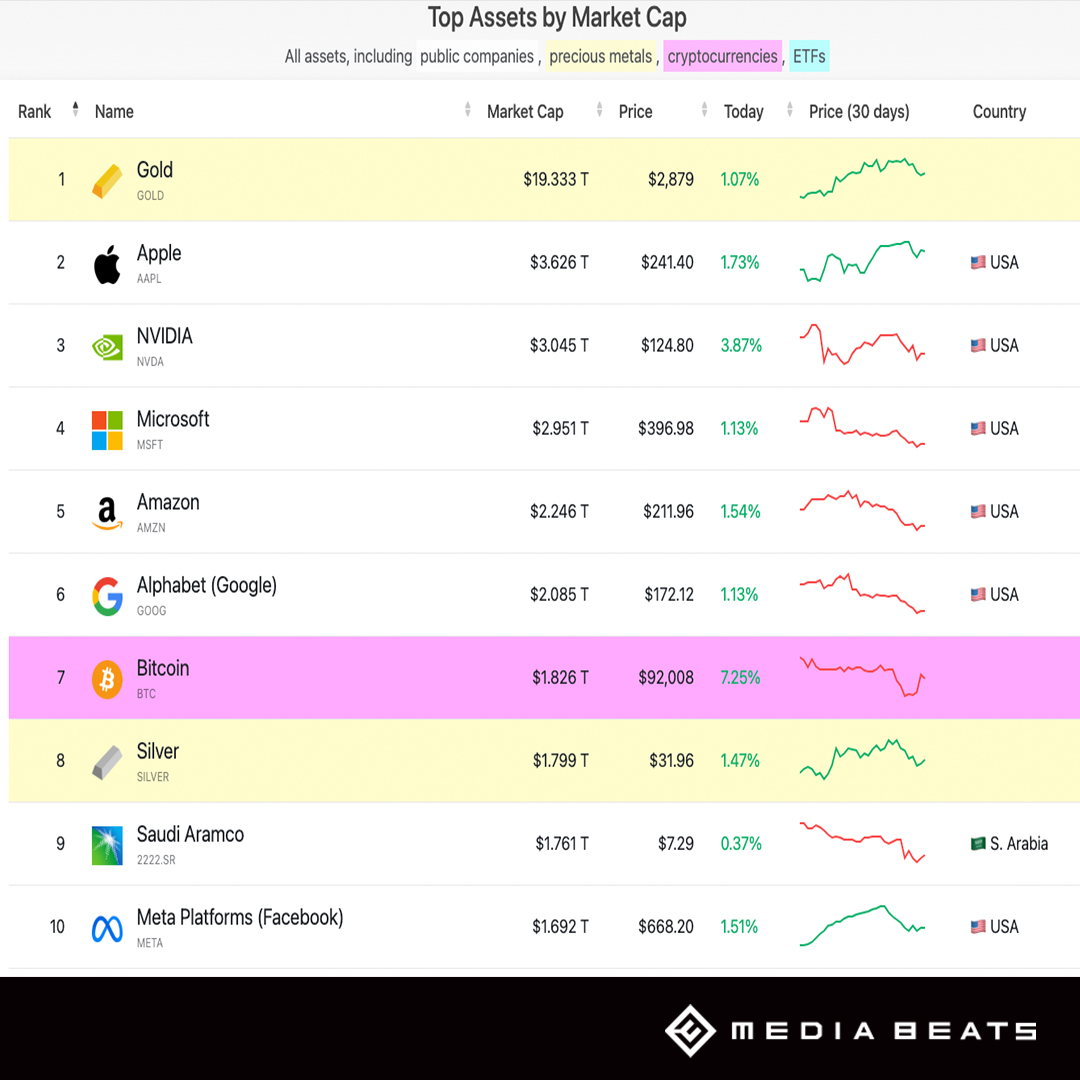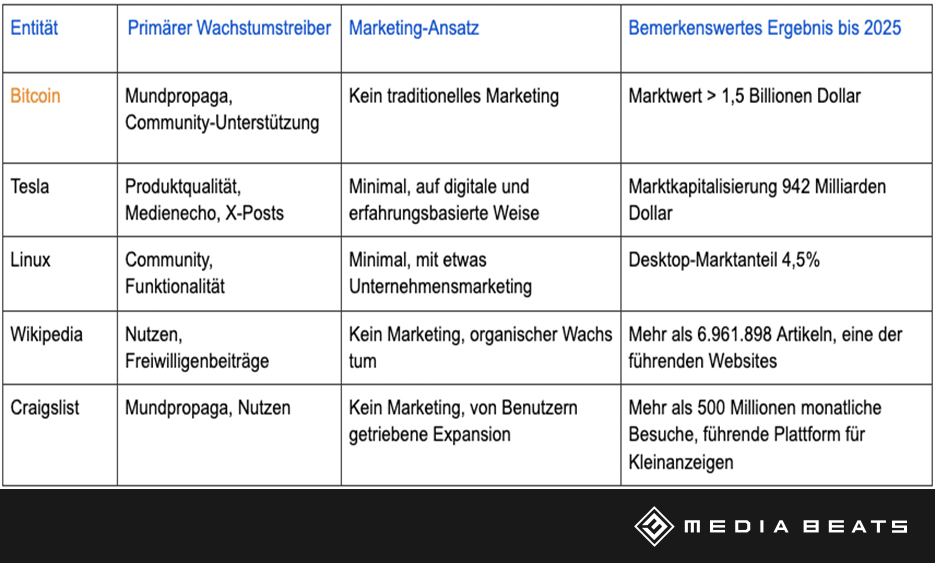
Successful without advertising: How Bitcoin, Tesla & Co. expanded despite everything
7. March 2025
Marketing is often considered indispensable for a company’s success. However, some globally known brands have thrived without traditional advertising. Bitcoin, Tesla, Linux, Wikipedia, and Craigslist demonstrate that innovation and community support can replace classic advertising strategies. This article examines how these companies gained massive market shares without large advertising budgets.
Bitcoin: Decentralized growth through price development and media presence
Bitcoin was launched in 2009 by an anonymous person or group called Satoshi Nakamoto. There was no traditional advertising or PR campaigns. Instead, the cryptocurrency spread through a dedicated community. This community consisted of tech enthusiasts, libertarians, and investors. The benefits of a decentralized financial system were discussed at the time in forums, blogs, and social media.
A key factor for Bitcoin’s popularity is its strong price development. Rising prices attract media and investors, which amplifies the network effect. Positive and negative media reports about price movements, regulatory discussions, or prominent supporters further promote its spread.
An example of this is the announcement by US President Donald Trump to include cryptocurrencies in a new strategic reserve. This led to an immediate increase in Bitcoin prices by more than 20 percent. Statements from public figures, banks, and governments also have a significant impact on public perception.
When prominent politicians or financial institutions speak out, it generates media attention and influences the price. Endorsements of Bitcoin by politicians like Robert F. Kennedy Jr. and Ron DeSantis contributed to intense discussions about cryptocurrencies in politics. Due to these factors, Bitcoin was able to build a global presence without traditional advertising, reaching a market capitalization of over 1.5 trillion US dollars.
Official Bitcoin reserve of the US:
The introduction of an official Bitcoin reserve by the USA marks a historic turning point in the financial landscape. For the first time, the state recognizes Bitcoin as a strategic reserve asset. This solidifies Bitcoin as the digital counterpart to gold. The immediate market reaction was mixed, but the long-term significance is clear. Bitcoin gains a new level of legitimacy. In the coming years, it will increasingly be regarded as a secure store of value.
The US government’s decision will not only strengthen the confidence of institutional investors but also promote the global acceptance of Bitcoin. Countries that have so far hesitated may now be forced to develop their own Bitcoin strategy. Otherwise, they risk falling behind. Initial political voices in Europe and Asia have already announced plans to assess the impact. Whether this marks the start of a new geopolitical Bitcoin race remains to be seen. But one thing is certain: Bitcoin is now part of the global financial architecture.

Tesla: Elon Musk as a marketing machine
Tesla, founded in 2003, follows a similar strategy. The company does not run TV commercials or print ads. Instead, it relies on media-effective product launches. The personal branding of Elon Musk plays an important role. He reaches millions through social media.
Musk uses his presence on X (formerly Twitter) to communicate product announcements directly to his community. The viral effects of his tweets about the Cybertruck launch or autonomous driving features generate free publicity that other companies have to pay dearly for.
Tesla has built a strong market position through innovative products, a loyal fan base, and authentic brand management. This position would be hard to imagine without traditional advertising. In 2025, the market capitalization stands at 1.26 trillion dollars. The company spends almost no budget on advertising.
Linux: Community-driven growth instead of advertising
The open-source operating system Linux demonstrates that a dedicated developer community is often more powerful than million-dollar budgets. Since the early 1990s, Linux has grown through voluntary contributions. Large advertising campaigns have not been necessary. Companies like IBM and SUSE have promoted Linux-based products. However, the underlying platform spread through technical excellence and word of mouth. Today, Linux dominates supercomputers, servers, and mobile operating systems (Android), with only minimal spending on marketing.
Wikipedia: The knowledge revolution without advertising
Wikipedia is one of the most visited websites worldwide, and that without a marketing budget. Since its launch in 2001, the platform has grown solely through its utility. Thousands of authors contribute voluntarily, helping its expansion.
Instead of advertising, the operators rely on fundraising campaigns that directly engage users. This model works so well that Wikipedia today has over 6 million articles. The platform also enjoys a high level of trust.
Craigslist: Minimalism as a growth strategy
Craigslist is another example of a brand that thrives without advertising. The simple classifieds platform relies on a straightforward user interface. Word of mouth is the main growth driver.
Although many competitors rely on elaborate marketing campaigns, Craigslist remains true to its no-frills approach. The result is over 50 billion page views per month. Craigslist ranks among the top 20 most visited websites in the USA.
Common success factors – What companies can learn from them
These examples show that success is possible without traditional advertising. The key success factors are:
- Innovative products: A unique offering like Bitcoin or Tesla’s electric cars attracts customers on its own.
- Community engagement: Users or developers contribute to brand building, as seen with Linux and Wikipedia.
- Media presence: PR, media coverage, and social media generate attention without companies having to pay for it.
- Organic growth: Through user recommendations and network effects, a brand can spread rapidly.
Companies that want to use similar strategies should build strong communities. They should focus on high-quality products and strategically use social media for PR.
Comparative analysis
In summary, the following table compares these entities based on growth drivers and marketing approach:

Conclusion
The success stories of Bitcoin, Tesla, Wikipedia, Linux, and Craigslist prove that traditional advertising is not the only path to success. Those who develop a strong product with high value and build a loyal community can scale without large advertising budgets.
For companies, this does not mean that marketing is unnecessary. However, it shows that alternative growth strategies can be just as effective. Especially for startups and companies with limited budgets, focusing on community building, PR, and social media can be a valuable approach to grow organically.
Sources:
- https://news.bitcoin.com/trump-signs-order-establishing-digital-fort-knox-bitcoin-reserve-funded-by-seized-assets/
- https://www.simplilearn.com/tutorials/marketing-case-studies-tutorial/tesla-marketing-strategy
- https://www.bitdegree.org/crypto/tutorials/blockchain-marketing
- https://en.wikipedia.org/wiki/Wikipedia
- https://www.encyclopedia.com/books/politics-and-business-magazines/craigslist-inc
- https://www.investopedia.com/articles/active-trading/072115/what-makes-teslas-business-model-different.asp
- https://medium.com/hackernoon/the-bitcoin-marketing-problem-1671bd036172
- https://hackaday.com/2019/10/31/linuxs-marketing-problem/
- https://en.wikipedia.org/wiki/Linux_adoptio
- https://uk.pcmag.com/news/142599/heres-why-craigslist-still-looks-the-same-after-25-years
Our blog
Latest news
With our blog, you are always close to our work, our current projects and the latest trends and developments in web and print.
Any questions?





